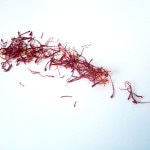After taking my vitamins and tinctures, when I first wake up, I make a matcha. Some people feel like the day doesn’t start until their first cup of coffee. I feel similarly about my morning matcha.
What makes my morning matcha recipe so hearty and invigorating? Cocoa butter and collagen peptides. Adding fat and protein to my cup of cancer-preventing polyphenols helps to blunt a blood sugar spike and crash and tempers my reaction to the caffeine that is in the dried leaves.
- 1-2 scoops collagen peptides
- 1 teaspoon cocoa butter (ghee, butter or coconut oil are other fats that work well)
- 1 teaspoon ceremonial or culinary matcha, organic preferred
- pinch of pink Himalayan salt
- 10-12 oz. water, just boiled
- ¼ teaspoon local honey or maple syrup, optional
- 1-2 Tablespoons heavy cream, milk, canned coconut milk (blended) or Nutpods, optional
- Combine the collagen peptides, cocoa butter, matcha powder and salt in your mug of choice and stir to incorporate.
- Using a handheld milk frother or a matcha whisk, slowly pour in the boiled water while blending or whisking until everything is combined.
- If desired, add a preferred sweetener and milk/cream.
What are the beneficial qualities of these extra ingredients?
Collagen
The science on supplementary collagen peptides doesn’t seem to have caught up with their popularity yet, but I still include it because since I’ve been taking it in this form, I have noticed digestive system improvements, more sustained energy, healthy skin and hair, and best of all, no morning caffeine jitters. There are studies showing people with fibromyalgia and temporomandibular joint pain (TMJ) who experienced a reduction in pain after taking collagen hydrolysate.
Matcha
EGCG, a compound in green tea, has also shown to be protective against inflammation, from which folks with fibromyalgia, and almost anyone with a chronic illness or disease, could strongly benefit. Green tea has also been shown by multiple studies to both prevent multiple types of cancer and inhibit its growth, a fact that has been all over the internet for years. Something you may not yet know is that green tea also affects oral health by preventing cavities, protecting against gum disease, and improving bad breath.
Fat
Consuming a bit more fat in the morning with caffeine also has health benefits, like preventing caffeine jitters, blood sugar spikes, and the crashes that follow. This is because blending matcha with fat using a frother (or countertop/immersion blender) breaks the fat into small droplets called micelles, which bind to caffeine molecules and slow their absorption.
Other Considerations
Blood Sugar
Blood sugar spikes aren’t good for anyone, but caffeine’s effect on blood sugar can be quite dangerous for people with diabetes. Adding fat to caffeinated beverages may be a safer way to consume coffee and tea. Keep in mind that different fats and different sources of caffeine may affect everyone differently, and may raise or lower insulin sensitivity (yay for bio-individuality!), so be sure to check with your medical professional and monitor yourself if you’re starting to experiment with butter coffee or tea.
Cravings
In general, I ask my consulting clients to look at their macronutrient ratios and consider reducing their carbohydrate consumption as they increase their fat intake. Starting the day with fat in this form is an easy way to feel satiated and prevent sugar cravings later in the day. If you’re following a ketogenic diet, omitting the honey or maple syrup should keep you in ketosis.

Photo by Matcha & CO on Unsplash




Leave a Reply